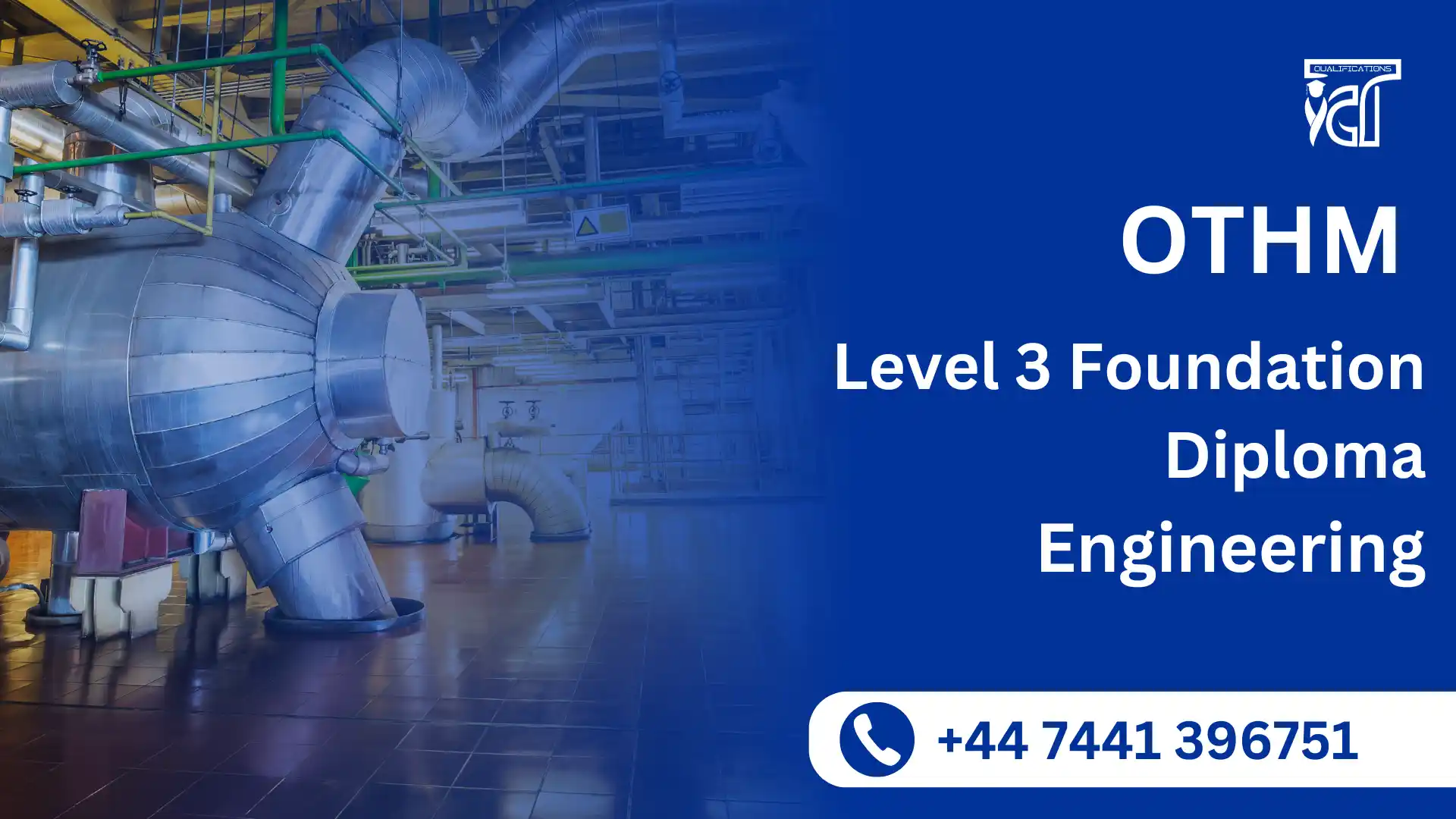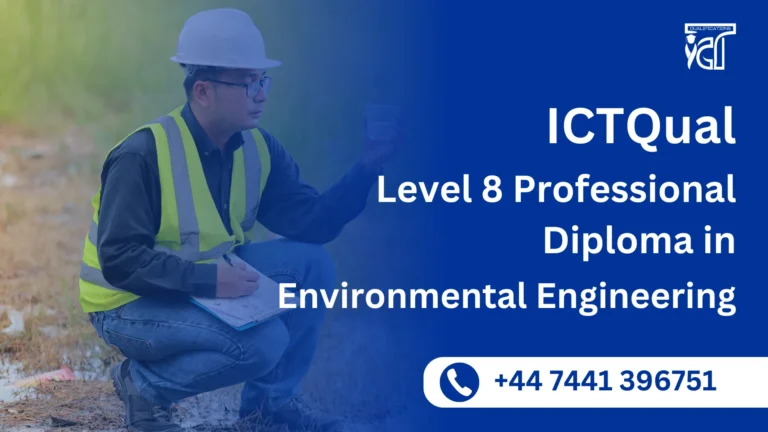The OTHM Level 3 Foundation Diploma in Engineering is a globally recognized qualification designed for individuals aspiring to build a strong foundation in engineering. This Ofqual-regulated qualification is an excellent choice for students who wish to progress in their engineering careers through higher education or employment. Unlike traditional examination-based qualifications, this diploma is entirely assignment-based, allowing students to develop practical and analytical skills through coursework.
The OTHM Level 3 Foundation Diploma in Engineering is designed to provide learners with fundamental knowledge of engineering principles, mathematics, and technical skills. The qualification helps students gain the necessary competencies to progress to Level 4 and beyond.
The OTHM Level 3 Foundation Diploma in Engineering is an ideal choice for individuals seeking a strong foundation in engineering. With its assignment-based assessment approach, Ofqual regulation, and industry-relevant curriculum, this qualification provides a solid stepping stone for further education and career growth. Whether you’re a school leaver or a working professional, this diploma offers a flexible and recognized pathway to success in the engineering field.
OTHM Level 3 Foundation Diploma in Engineering
The qualification comprises six mandatory units, amounting to a total of 60 credits, with a Total Qualification Time (TQT) of 600 hours and 240 Guided Learning Hours (GLH) required for completion.
Mandatory units
| Sr# | Unit Title | Credits | GLH |
|---|---|---|---|
| 1 | Engineering Principles | 20 | 40 |
| 2 | Design Technology | 20 | 40 |
| 3 | Electricity | 20 | 40 |
| 4 | Mechanics | 20 | 40 |
| 5 | Introducing Statistics | 20 | 40 |
| 6 | Mathematics | 20 | 40 |
GLH (Guided Learning Hours) and TQT (Total Qualification Time) are terms commonly used in vocational qualifications to help define the amount of time a learner is expected to spend on heir studies.
1. GLH (Guided Learning Hours)
GLH refers to the number of hours a learner spends being directly taught, supervised, or supported during their course. This includes the time spent in activities such as:
- Classroom instruction
- Practical workshops
- One-on-one tutoring or mentoring sessions
- Online learning sessions with tutor support
In other words, GLH represents the time that learners are actively engaged with their instructors or learning activities.
2. TQT (Total Qualification Time)
TQT represents the total amount of time a learner is expected to invest in completing a qualification, including:
- GLH (Guided Learning Hours): Time spent on direct learning, as explained above.
- Self-Directed Learning: This includes time spent on independent study, research, assignment completion, preparation for exams, and any other work the learner does outside of direct teaching hours.
TQT is a broader measure that includes all the time required to achieve the qualification. It helps learners and employers understand the overall commitment required for the qualification.
Key Differences Between GLH and TQT:
- GLH focuses on direct learning with guidance or supervision.
- TQT includes GLH as well as independent study time and other learning-related activities.
Example:
If a qualification has a TQT of 600 hours and a GLH of 250 hours, it means the learner should spend 250 hours in direct learning (classroom, online, or tutor-led sessions) and 350 hours on independent study or research.
Learning Outcomes of OTHM Level 3 Foundation Diploma in Engineering
Engineering Principles
- Understand applications of SI units and measurement.
- Know how to perform engineering calculations
- Know how to interpret engineering information.
Design Technology
- Demonstrate knowledge and understanding of engineering products and design.
- Understand how to apply a systems approach to electrical design.
- Be able to produce 2D CAD drawings.
Electricity
- Understand the functions of basic electrical components within circuits
- Be able to apply AC and DC circuit theory to circuit design.
- Understand power supplies and power system protection
Mechanics
- Understand the motion of objects in mathematical terms.
- Understand energy changes in a system.
- Understand energy transfer, forces and elasticity.
Introducing Statistics
- Understand the underpinning concepts relating to the analysis of statistics.
- Understand a range of data types and their representation.
- Be able to calculate and interpret statistical diagrams and measures.
Mathematics
- Understand the application of algebra relevant to engineering problems.
- Be able to use geometry and graphs in the context of engineering problems.
- Understand exponentials, logarithms and trigonometry related to engineering problems.
- Understand calculus relevant to engineering problems
Course Benefits of the OTHM Level 3 Foundation Diploma in Engineering
1. Flexible Learning Approach
This course is entirely assignment-based, which means learners have the flexibility to complete their coursework at their own pace. This makes it ideal for students balancing studies with work or personal commitments.
2. Pathway to Higher Education
The qualification serves as a stepping stone to higher education. Graduates can progress to OTHM Level 4 Diplomas in Engineering or equivalent qualifications, ultimately leading to undergraduate degrees in engineering disciplines.
3. Practical and Industry-Relevant Skills
The curriculum is designed to align with industry needs, ensuring learners develop essential technical and analytical skills required in real-world engineering roles. This makes graduates more competitive in the job market.
4. Globally Recognized Qualification
Since this diploma is regulated by Ofqual, it is recognized by employers and educational institutions worldwide. This ensures a seamless transition into further studies or employment opportunities in the engineering sector.
5. No Exams – Assignment-Based Assessment
One of the biggest advantages of this diploma is that it is 100% assignment-based, eliminating the stress of traditional exams. Learners are assessed through practical assignments, research projects, and case studies that enhance their critical thinking and problem-solving abilities.
6. Career Advancement Opportunities
For working professionals, this qualification helps enhance their engineering knowledge and skills, making them eligible for better job roles and career progression. It also provides a solid foundation for specialized fields such as mechanical, electrical, and civil engineering.
The ideal learner of the OTHM Level 3 Foundation Diploma in Engineering are as :
1. Aspiring Engineers
This course is designed for individuals with a passion for engineering and problem-solving. If you have a keen interest in understanding how things work, designing solutions, and applying mathematical principles, this diploma is an ideal starting point for your career in engineering.
2. School Leavers and College Students
Students who have recently completed their secondary education and are looking for a solid foundation in engineering will benefit from this course. It provides essential theoretical and practical knowledge to help them transition into higher education or entry-level engineering roles.
3. Career Changers
If you are considering switching to a career in engineering, this diploma offers the perfect foundation. It provides the fundamental knowledge needed to enter the field and progress toward specialized areas such as mechanical, electrical, or civil engineering.
4. Working Professionals Seeking Career Growth
Engineers or technicians already working in the industry can use this qualification to enhance their technical skills and improve their career prospects. This diploma can help professionals qualify for higher roles or pursue further studies in engineering.
5. Individuals Looking for a Flexible Learning Option
Since this qualification is entirely assignment-based, it is ideal for learners who prefer a flexible study schedule. Whether you are balancing studies with work or other commitments, this course allows you to progress at your own pace without the stress of exams.
6. Students Seeking a Pathway to Higher Education
For those planning to pursue an undergraduate degree in engineering, this diploma serves as a stepping stone. It provides the necessary academic foundation to advance to Level 4 diplomas and beyond, ultimately leading to university degree programs.
Entry Requirements
Register Now
Qualification Process
Qualification Process OTHM Level 3 Foundation Diploma in Engineering
- Self-Assessment:
Begin by evaluating your eligibility to ensure you meet the qualification requirements, including work experience, knowledge, and language proficiency. - Registration:
Complete your registration by submitting the required documents, including a scanned copy of a valid ID, and paying the registration fee. - Induction:
An assessor will conduct an induction to confirm your eligibility for the course and explain the evidence requirements. If you do not meet the criteria, your registration will be canceled, and the fee will be refunded. - Assignments & Evidence Submission:
Provide all assignments and the necessary evidence based on the assessment criteria outlined in the course. If you are unsure of the required evidence, consult with the assessor for guidance on the type and nature of evidence needed. - Feedback and Revision:
The assessor will review your submitted evidence and provide feedback. Evidence that meets the criteria will be marked as “Criteria Met,” while any gaps will be identified. You will be asked to revise and resubmit if needed. - Competence Evidence:
Submit final evidence demonstrating that all learning outcomes have been met. This evidence will be marked as “Criteria Met” by the assessor once it is satisfactory. - Internal Quality Assurance (IQA):
The Internal Quality Assurance Verifier (IQA) will review your evidence to ensure consistency, quality, and compliance with standards. - External Verification:
The IQA will submit your portfolio to OTHM External Quality Assurance Versifier (EQA) for final confirmation. The EQA may contact you directly to verify the authenticity of your evidence. - Certification:
Upon successful completion of all checks, OTHM will issue your official certificate, confirming that you have attained the OTHM Level 3 Foundation Diploma in Engineering







